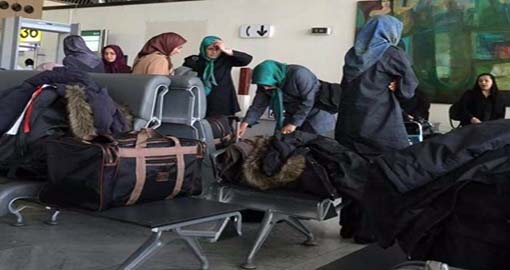
BAGHDAD — On Sept. 10, commenting on the news that the last batch of Iranian dissidents affiliated with the Mujahedeen-e-Khalq (MEK) had left Iraq and were heading to Albania in a deal that the United States mediated and the United Nations supervised, the Iraqi government declared it had "closed the book on the Baathist regime."
The last group of Iranians was composed of 280 dissidents. They had lived in Camp Liberty refugee camp in Baghdad since 2012, after the Iraqi government transferred them from Camp Ashraf in Diyala province, along the Iraq-Iran border, in which they had lived for almost three decades.
On Sept. 12, US Secretary of State John Kerry expressed his happiness about the MEK members’ departure from Iraq and escaping the danger that was threatening their lives there, saying, "Their departure concludes a significant American diplomatic initiative that has assured the safety of more than 3,000 MEK members whose lives have been under threat."
Kerry added, "[Camp Liberty] had on many occasions been shelled. There were people killed and injured. And we have been trying to figure out a way forward. … After steady progress over a period of months, I visited Tirana earlier this year and I discussed with the Albanian government how to assist in facilitating the transfer and the resettlement of the last group of MEK members from Camp Liberty. … I’m very proud that the United States was able to play a pivotal role in helping to get this job done."
Every now and then, Camp Liberty, which had sheltered MEK members for four years, would be bombed with mortars and rockets by armed groups close to Iran. For instance, Watheq al-Battat, a leader for the armed faction Hezbollah in Iraq who was reportedly killed in 2014, claimed responsibility for carrying out an attack against the camp in 2013, killing seven people and wounding 100 others.
On Sept. 10, Iraqi Prime Minister Haider al-Abadi’s media bureau issued a press statement, expressing the prime minister’s satisfaction with the departure of the last Iranian dissidents. The government statement read, "The Iraqi government has completely eliminated the presence of the MEK on Iraqi territory and was able to close this file and close the book on the Baathist regime."
A major burden has been lifted off Baghdad’s shoulders after 13 years. The MEK, which Iran-affiliated Iraqi parties call the "Khalq hypocrites," was close to Saddam Hussein’s regime and had opposed the velayat-e faqih project, which has had strong ties with the Iraqi governments for 13 years.
Iran exerted great pressure on Iraqi authorities to put an end to the MEK in their country, because the group created a source of concern for Iran’s presence and projects there. This is why Baghdad breathed a sigh of relief as it bid farewell to the opponents of velayat-e faqih.
Iranian Deputy Foreign Minister for Arab and African Affairs Hossein Jaberi Ansari said Sept. 11, "The hypocrite terrorists — the MEK — had many conspiracies and committed crimes against the Iranian and Iraqi peoples. This is why their departure helps to spread chaos all around the world. On the other hand, the departure of al-Qaeda, which attacked both the Iranian and Iraqi people, was a good thing. They will be brought to justice sooner or later."
Majed Ghammas, the representative of the Lebanese Shiite Supreme Council to Tehran, told Iranian Tasnim news agency that the MEK’s departure from Iraq was "humiliating."
Meanwhile, Fatima al-Zarakani, an Iraqi member of parliament for the State of Law Coalition led by Nouri al-Maliki, told Al-Monitor, "The MEK is a terrorist group. They had great cooperation with the Baathist regime to exterminate the Iraqi people. Their departure from Iraq is a major positive step toward getting rid of the Baathist regime’s affiliates in the war against Iraqis. … The MEK has played a negative role in Iraq before and after 2003, as well as it has sought to please the Baathist regime and Iraq’s enemies through acts that harmed the Iraqi political process."
However, Maryam Rajavi, the president of the National Council of Resistance of Iran, commented on the last Iranian dissidents’ transfer from Iraq to Albania and said, "This process is a strategic defeat for the regime in Tehran, where the bells rang marking the start of change [in Iran], attack and crawl operations."
She added, "The conspiracies and schemes to eliminate the MEK were defeated. The velayat-e faqih regime remained, along with its Ministry of Intelligence, its terrorism power and all its spies in Iraq who were hungry for the blood of MEK members, dragging their tails between their legs in shame."
For his part, an Iranian dissident who spent time in Camp Ashraf in Iraq but currently resides in Paris, told Al-Monitor on condition of anonymity, "The suffering the MEK members had to endure in Iraq over the past 13 years cannot be described. But we can describe the steadfastness with which we confronted Mullahs’ attempts to annihilate us; we were victorious and the dictatorial regime was defeated."
Of course, the MEK’s departure from Iraq after they had been present there for 30 years has eliminated the threat posed against the Iranian regime, since the MEK’s proximity to Iranian interests in Iraq could not have been easy for Tehran.
After 2013, Iraq’s Shiite governments missed the chance to take advantage of both the presence and the departure of MEK members in strengthening their position vis-a-vis neighboring Iran, thereby enhancing Iraq’s national interests in the midst of regional rivalries over Iraq.
By Mustafa Saadoun , al-monitor, Translator : Cynthia Milan

